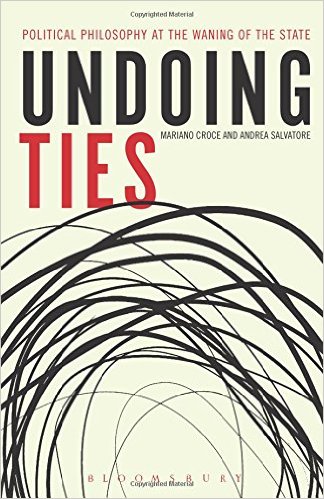Book Review: Undoing Ties: Political Philosophy at the Waning of the State by Mariano Croce and Andrea Salvatore
Undoing Ties: Political Philosophy at the Waning of the State. Mariano Croce and Andrea Salvatore. Bloomsbury. 2015.
 The decline of the state is one of the most consistently invoked topoi of contemporary political theory, especially when the latter concerns itself with arriving at an understanding of the dynamics inherent to the forces of globalisation and the impact of technological innovation. While the state’s ‘waning’ does appear as part of the title of this book, Mariano Croce and Andrea Salvatore, scholars at Rome’s Sapienza University, do not intend to add yet another argument to those debates. Their aim is to highlight the link between the ‘crisis of politics’ and the ‘crisis of philosophy’ (xiv), and thus to problematise the dissolution of the institutional ties that have governed Western societies since early modernity.
The decline of the state is one of the most consistently invoked topoi of contemporary political theory, especially when the latter concerns itself with arriving at an understanding of the dynamics inherent to the forces of globalisation and the impact of technological innovation. While the state’s ‘waning’ does appear as part of the title of this book, Mariano Croce and Andrea Salvatore, scholars at Rome’s Sapienza University, do not intend to add yet another argument to those debates. Their aim is to highlight the link between the ‘crisis of politics’ and the ‘crisis of philosophy’ (xiv), and thus to problematise the dissolution of the institutional ties that have governed Western societies since early modernity.
Accordingly, Undoing Ties: Political Philosophy at the Waning of the Statepresents an astute attempt to develop a meta-account, as it were, of the multiplicity of approaches advanced by contemporary political theory to explain the profound changes on both national and international levels. Enriching their close readings of key political philosophers with interdisciplinary – jurisprudential, sociological, anthropological – accounts, the authors undertake to offer an introductory overview of current debates on the transformation of the state or, as they put it, the question of ‘what will happen to political philosophy when its constitutive shell is morphing and fading’ (vii).
The book, first published in Italy in 2012 and translated by the authors themselves, is divided into three parts, each devising a particular vantage point on the altering role of the state: after,above and without the state. Against the backdrop of this threefold categorisation, Croce and Salvatore shed light on their central claim: namely, that what we are witnessing is a ‘major transition in the field of political philosophy’, effected by the ‘reviviscence of sub-state and supra-state groups as crucial actors vis-à-vis the state’ (vi). The object of their investigation is therefore not the state itself, but the relation between its phenomenal form and its theorisation in political philosophy.
Chapter One, ‘After the State’, and Chapter Two, ‘Above the State’, scrutinise a wide array of influential theories of government, democracy, justice and globalisation, subjecting to meticulous analysis the theoretical claims introduced by the likes of John Rawls, Will Kymlicka, Michel Foucault, Jürgen Habermas, Zygmunt Bauman and Ulrich Beck. The seamless sequence of the corresponding paradigms, from liberalism to governmentality, from cosmopolitanism to realism, is at times dizzying and might have been signposted more clearly, but is nonetheless most valuable and illuminating in its internal perspicuity and conciseness.
While focusing on these respective authors and theories, the analyses are interspersed with critical remarks, and each (sub-)chapter concludes with a discussion of the strengths and shortcomings of the preceding notions. On those occasions, the authors indicate their own positioning: for instance, when taking a critical stance toward the consistency and normative legitimacy of new constitutionalism (41-43), or when, in a Schmittian gesture, they dismantle the ‘judicialization of politics’ and the corresponding ‘politicization of justice’ (57-59) inherent to the emphasis on legal settlement in many theories of justice. Those comments turn the volume from a mere textbook into a thought-provoking and engaging account of concurring theoretical notions offered by contemporary political theory.

Image Credit: Erich Ferdinand
Cosmopolitanism provides another prevalent paradigm to be subjected to the authors’ scrutiny. Contending that this strand of political thought, famously promoted by Immanuel Kant, is predicated on a precarious relation to the state (90), Croce and Salvatore debunk its deeply entrenched Eurocentric perspective when it comes to the discursive tools and categories it employs and the ‘political and socio-cultural experience’ its proponents draw upon (98). Presenting these inconsistencies, the authors conclude that the alleged cosmopolitan approach of thinking ‘above the State’ is flawed by its ignorance vis-à-vis its very own conflictual basis, a weakness they see as being partially tackled by what they call a ‘cosmopolitanism from below’ (99-102).
It is in light of the shortcomings of theories still, and uneasily, associated with the state that Croce and Salvatore turn to paradigms that set out to think a condition ‘without the State’ in Chapter Three. In this section of the book, they present theoretical ideas that come closest to their initially advanced thesis of the re-emergence of sub-state groups as significant political actors. Specifying this claim, they assert that with the dissolution of ‘the mediatory function of the state’, a ‘multiplicity of semi-autonomous sectors’ (107) arises, thus displacing the traditional univocal locus of sovereignty (the state) and evoking notions of pluralism situated precariously in between law and market rationalities.
Having examined different strands of legal pluralism, Croce and Salvatore amalgamate their earlier chiasmus into the question of whether those efforts imply a ‘juridification or de-politicization’ (145). Finding that ideas of a ‘global legal pluralism’ (148) run on liberal presuppositions, they consider the effects of the market, or, more precisely, of neo-liberalism as a ‘rationality’ (150). With recourse to the biopolitical paradigm advanced by Foucault, they conceive of neo-liberalism as a project that aspires to the construction of the market as ‘theperfect model of integration’ (151), thus pitting the holistic approach of a neo-liberal rationality against the traditional claim to the sovereignty of the state.
Doing so, the authors inscribe the erosion of the state into an ever intensifying marketisation of politics, which they illuminate with reference to John L. Comaroff and Jean Comaroff’sEthnicity Inc. (2009) as both the realisation and expression of the ‘commodification of culture’ and ‘the rise of law as a new fetish of global politics’ (154-55). Concluding with this focus on the increasing encroachment of the commodity form on all spheres of life and the concomitant reduction of politics to the enactment of law, Croce and Salvatore consolidate the impression of the critical impetus driving their account of Undoing Ties.
If their book lacks in anything, it is reference to those theoretical works that undertake to challenge the very thesis of the waning of the state. A prominent exponent of this approach,Quentin Skinner (2011) has argued that the claim of the vanishing of the state is oftentimes premised on confounding two very distinct dimensions of analysis: namely, the state as concept and the state as mere apparatus of government. Proposing to conceive of the state as a persona ficta – as always more than its respective governmental incarnation – Skinner provides an account particularly valuable when looking at the role of the state in devising a ‘neo-liberal rationality’ – a point from which Croce and Salvatore’s work might have additionally benefited.
Notwithstanding, with the authors taking the thesis of the state’s waning as their starting point,Undoing Ties offers a highly elucidating insight into the theoretical state of art, complemented by a critical evaluation that helps readers adopt a differentiated perspective on one of the core issues of contemporary political theory.
—
Note: this post represents the views of the author and not those of Democratic Audit or the UK. Please read our comments policy before posting. It originally appeared on the LSE Review of Books.
—
Nicolas Schneider graduated from LSE’s European Institute with a MSc in European Studies in 2014. He is currently based in Berlin, writing and translating. Read more reviews by Nicolas Schneider.





 Democratic Audit's core funding is provided by the Joseph Rowntree Charitable Trust. Additional funding is provided by the London School of Economics.
Democratic Audit's core funding is provided by the Joseph Rowntree Charitable Trust. Additional funding is provided by the London School of Economics.
Book Review: Undoing Ties: Political Philosophy at the Waning of the State by Mariano Croce and Andrea Salvatore https://t.co/k75vLVIS4K
Book Review: Undoing Ties: Political Philosophy at the Waning of the State by Mariano Croce and Andrea Salvatore -… https://t.co/fOjyykUiim
Book Review: Undoing Ties: Political Philosophy at the Waning of the State by Mariano Croce and Andrea Salvatore https://t.co/gCpb1MMMn5
Book Review: Undoing Ties: Political Philosophy at the Waning of the State by Mariano Croce and Andrea Salvatore -… https://t.co/noGrFvOlZ7
Book Review: Undoing Ties: Political Philosophy at the Waning of the State by Mariano Croce… https://t.co/aqfVSxRS4Y https://t.co/KYw1GDyH4h